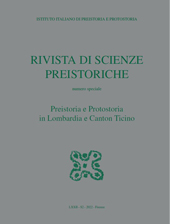Lo stato della ricerca di arte rupestre in Valcamonica, Italia : un aggiornamento sulle ricerche a Paspardo
P. 297-322
Twelve years ago during the 42th Scientific Conference of IIPP a report updated the state of the rock art research in Valcamonica. The current report summarizes the rock art studies of the last decade managed by the Cooperativa Archeologica Le Orme dell'Uomo of Cerveno (BS), with the Catholic University of the Sacred Heart of Brescia (CALOU-UCBS) often in collaboration with the State University of Milan and the Civic Museum of Bergamo. The CALOU-UCBS group traditionally concentrates its fieldwork in Paspardo where the Valcamonica Rock Art Field School & Fieldwork continues research on the numerous sites along the new and the old Deria road (La ‘it, ‘al de Plaha, Bial do le Scale, Dos Sottolajolo, In Valle, La Bosca, mainly within the Natural Regional Reserve) under the Ministry/Superintendence concession.
In this area rock art spans from the 5th to the 1st Millennium BC with typical themes including: topographic representations, schematic humans, warriors, wild and domestic zoomorphs. Archaeological excavations at the Bial do Le Scale and La ‘it sites are investigating the relationship of the ancient terraced agricultural area (a percentage of which include presence of old chestnuts trees) and engraved rocks. Five other sites within the Adamello Park have been researched: Dos Costapeta, Gras de Le pegore, Clef del Popomm, Dos Sulif, Baite Fles Saline. In the last years the research has concentrated primarily on the site of Castel (Castle) where a fringed mantel figure was discovered on an open air rock (rather than engraved on a stele as expected); paintings have been investigated at the Bial do le Scale site. [Publisher's text]
Forma parte de
Rivista di scienze preistoriche : LXXII, supplemento, 2022-
Artículos del mismo número (disponibles individualmente)
-
Información
Código DOI: 10.32097/1177
ISSN: 2282-457X


